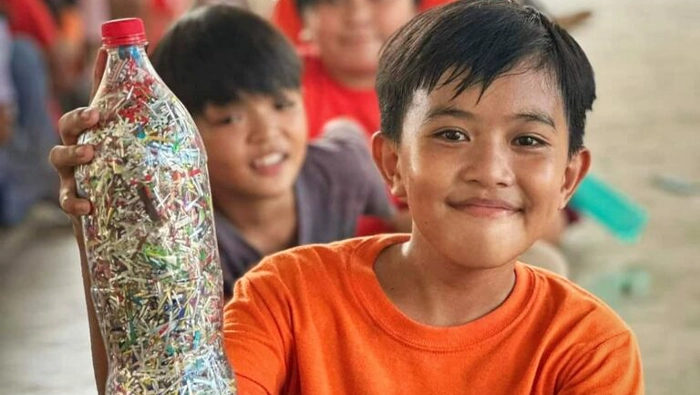With “green” projects, Kiwanis clubs are serving kids and safeguarding the future. Here are a few examples.
By Julie Saetre
Kiwanians around the world know that helping kids includes helping the planet we all live on. These Kiwanis clubs have found innovative ways to do both, from community gardens to environmental awareness programs. Let them inspire your own Earth-friendly club project.
Recycling plastic in Aklan, Philippines
The Kiwanis Club of Golden Salakot Aklan in the Southern Philippine District recently launched Project BAYLO: “Basura ay Yaman at Likas kayang Oportunidad Para sa Kabataan,” a Filipino acronym for “Trash is a treasure and a sustainable opportunity for the children.”
The initiative encourages children to collect at least 525 grams of shredded and compacted single-use plastics, place them in plastic bottles and exchange the bottles for a kilo of rice and school supplies. This innovative approach not only tackles plastic waste but also empowers kids by providing them with essential resources in exchange for their help in creating a cleaner environment.
This project aligns with the Kiwanis Asia-Pacific Region’s environmental stewardship campaign by promoting social responsibility and by contributing to the production of eco-friendly chairs, benches and other items made from the collected plastics.
Project BAYLO kicked off at Kalibo Pilot Elementary School in Aklan, Philippines, with 150 children participating.
Putting down roots in Jamaica
In Jamaica, two club presidents had an idea: Get young people involved in raising awareness about climate change issues. The result was the Climate Change and Disaster Risk Mitigation Project — a joint effort of the Kiwanis Club of North St. Andrew and the Kiwanis Club of Eastern St. Andre.
In 2018, members of several CKI, Key and Builders Clubs were challenged to develop a project in their schools to reduce the effects of climate change based on training they all received from experts. The winner of the competition was the Half Way Tree Primary Builders Club for its rooftop garden project, which is still growing strong today. The green roof helps absorb rainwater, provides insulation, creates a habitat for wildlife and lowers urban air temperatures.
Growing produce and job skills in Tulsa
In North Tulsa, Oklahoma, U.S., some 4,000 children live in low-income families. Twenty-five percent go to bed hungry every night, and 58% drop out of school before graduating high school.
Chris Beach, a member of the Tulsa Kiwanis Club, knows these statistics too well. He is the director of partnerships and development for Tulsa YouthWorks, which empowers more than 200 at-risk elementary school children in North Tulsa. Beach’s fellow Kiwanians provided YouthWorks with a US$55,000 donation to teach kids how to grow fruits and vegetables year-round in the Multi-Ponic Greenhouse, which uses hydroponic, aquaponic and aeroponic systems.
Now kids are learning advanced gardening skills, and the produce is helping feed North Tulsa families through area churches and other strategic partners.
Teaching green living in Victoria
The Kiwanis Club of Shepparton Sunrisers, Victoria, Australia, received a silver award in the 2023 Kiwanis Signature Project Contest for its Sprout Healthy Lifestyle Garden and Education Centre. Attached to the KidsTown Adventure Playground, this interactive space offers multicultural and indigenous food demonstrations, workshops on caring for the local environment, health programs for children and the chance for families to spend quality time together outdoors. The interactive Adventure Playground is free and easily accessible to the 10,000 annual KidsTown visitors.
Tagging trees in Ohio
Mike Marks, a member of the Bath Richfield Kiwanis Club in Ohio, U.S., loves trees. In 2022, he and fellow Kiwanian Laura Yost proposed labeling trees as a club project. Through Kiwanis Naming of Trees, or KNOT, Bath Richfield club members create club-branded signs that include the common name of the tree, its genus and species, a picture of its bark, nut or flower and a fun fact.
The entire club membership researches the fun facts used, and arborists contribute their time to help identify each tree and supply the scientific information. Next up: a partnership with staff and students at Bath Elementary School to identify, tag and name trees along nature trails on the school’s property.

